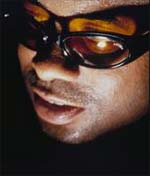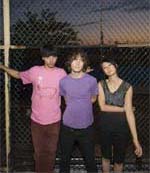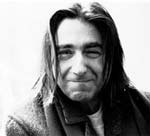| |
|
|
|
|
|
|
| |

$14.99 CD


|
|
HENRY FLYNT
Nova'billy
(Locust)
 "Conga" "Conga"
 "Good Morning" "Good Morning"
We should know by now to expect each new release from maverick composer-philosopher Henry Flynt to be curve ball, but unless you caught the mailorder-only 45 that Locust offered last year, there's probably little that will prepare you for this stunning and outright jammin' full-length from Flynt's short-lived boogie-rock band, Nova'billy. Originally recorded between 1974 and '75 but never released, H.F. and Nova'billy, while surprising, is not by any means unprecedented in the Flynt catalogue. While most ostensibly an extension of Flynt's radical reconfiguration of Southern music, one can also sense a smart and seamless synthesis of many of his ideas and experiments with rock, free jazz, North Indian, and ecstatic musics. Guitar, saxophone, keyboards and, of course, Flynt's unmistakable violin playing -- here in particularly fiery form -- wail, blast and even trade hot licks over a rhythm section that varies from the "Wipeout" style intro of the opening "Conga" to firmly in-the-pocket back beats to unhinged percussive battery. Despite being ripe with memorable moments of collective improvisation, trance-like drones, minimal repetition and at least one passage of cathartic vocal howl, Nova'billy is a decidedly "populist" record (or at least, yearns to be). It was, it would seem, born to boogie. The tracks are full of hooks and Flynt's vocals are odd and affecting, imparting both idealistic pleas for collective change and everyman internal monologues (see "I Was a Creep"). Then of course, there are the politics: staunch leftist ideology that Flynt has since rescinded but which obsessed him at the time -- the second song is none other than the International Communist Party theme song. In many ways, Flynt's Vietnam-era protest band, the Insurrections, is the most direct precedent in the Flynt catalogue to this record; but if the Insurrections were all agit-prop, proto-no wave garage rock, then Nova'Billy is pure utopian Communist party music.
Though best known for his long-form country and raga-inspired drone pieces, there is still, as this album attests, much that remains to be seen about Flynt's musical output, a truly underground (and apparently endless) body of work which seems to gain in complexity and intrigue with each new release. What is almost as amazing as the sheer number and variety of ideas Henry Flynt has had is the uniformity with which those ideas were rejected when they first appeared. Granted, Soho in the 1970's -- a scene that would soon burst at the seams and become the bloated money-bubble of the 80's New York art world -- may have not been the ideal time and place to start a country-boogie band with a leftist agenda, but if there is one thing that Flynt has done consistently, it is traffic in beautifully impossible visions. Highest Recommendation. [CC] |
|
| |
|
|
|
|
|
|
|




 Enon
Enon






















